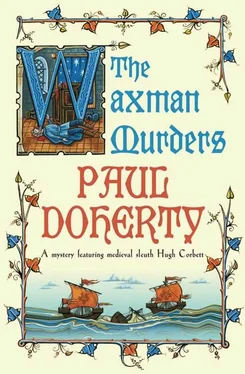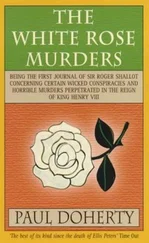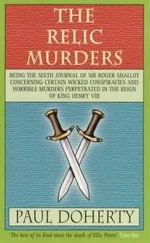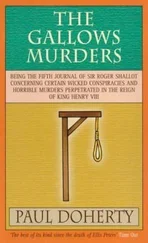Paul Doherty - The Waxman Murders
Здесь есть возможность читать онлайн «Paul Doherty - The Waxman Murders» весь текст электронной книги совершенно бесплатно (целиком полную версию без сокращений). В некоторых случаях можно слушать аудио, скачать через торрент в формате fb2 и присутствует краткое содержание. Год выпуска: 0101, Жанр: Исторический детектив, на английском языке. Описание произведения, (предисловие) а так же отзывы посетителей доступны на портале библиотеки ЛибКат.
- Название:The Waxman Murders
- Автор:
- Жанр:
- Год:0101
- ISBN:нет данных
- Рейтинг книги:3 / 5. Голосов: 1
-
Избранное:Добавить в избранное
- Отзывы:
-
Ваша оценка:
- 60
- 1
- 2
- 3
- 4
- 5
The Waxman Murders: краткое содержание, описание и аннотация
Предлагаем к чтению аннотацию, описание, краткое содержание или предисловие (зависит от того, что написал сам автор книги «The Waxman Murders»). Если вы не нашли необходимую информацию о книге — напишите в комментариях, мы постараемся отыскать её.
The Waxman Murders — читать онлайн бесплатно полную книгу (весь текст) целиком
Ниже представлен текст книги, разбитый по страницам. Система сохранения места последней прочитанной страницы, позволяет с удобством читать онлайн бесплатно книгу «The Waxman Murders», без необходимости каждый раз заново искать на чём Вы остановились. Поставьте закладку, и сможете в любой момент перейти на страницу, на которой закончили чтение.
Интервал:
Закладка:
The second letter, from the Prior of Westminster, was brief and succinct. Brother Hubert of Canterbury had left their community early in the summer of 1293. Before his swift departure he had destroyed all records of himself and disappeared from view. He had never returned. Hubert’s departure, the prior confided, was as abrupt and sudden as a summer storm. Until then he had been a veritable beacon of light: a great scholar with a flair for study, well liked by his brethren, an obedient monk who strictly observed the rule of St Benedict in every way. As to his description, he was slim, of medium height, with comely face and pleasant manner. The only thing the prior had discovered was that Brother Hubert had received a mysterious visitor around the time of Pentecost. Once he had left, Brother Hubert had retreated to his private cell claiming sickness; three days later he was gone. Rumours had seeped back that Hubert had forsaken not only his vows, but any love of God, becoming a venator hominum — a hunter of men — but the prior could not comment on this.
Corbett put both letters down as he heard a knock on the door and Ranulf calling his name. He unlocked and unbarred the door, and Ranulf came in bearing a fresh goblet of posset wrapped in a napkin. Uninvited, he sat down on a stool.
‘Chanson is sleeping, master, and so you should be.’
Corbett took the goblet, sat on the edge of his bed and sipped carefully. He was determined on a soul-fast sleep, no heart-shaking dreams, phantasms or nightmares fed by too much wine. He stared down at the cold grey stone floor and shivered at a nasty draught which seeped like a fiend beneath the door to prickle the skin.
‘Master?’
Corbett glanced up.
‘What sense do you make of this?’
‘What sense?’ Corbett laughed. ‘Why, Ranulf, none at all.’ He sipped once more from the wine, put the cup down between his buskined feet and leaned forward, hands together. ‘Ranulf, have you heard from Lady Constance?’
Ranulf blushed at the mention of the daughter of the Constable of Corfe Castle. He’d met her only a few weeks before when he and Corbett were on royal business in the West Country.
‘Oh, not yet, Master, but this present business?’
‘I mention this present business because you are determined on advancement in the royal service or, if you decide so, to enter the church as a priest, though one spurred by great ambition. Is that not true, Ranulf?’
His manservant shuffled his feet, wiping the palms of his hands on his hose, but he held Corbett’s gaze. This was a matter he had often discussed with Master Long-Face. Ranulf was determined on his own advancement. He had studied every book Corbett had loaned him, and scrutinised his master’s methods as carefully and avidly as any hungry cat would a mousehole.
‘One thing I have taught you,’ Corbett held his hands up as if in prayer, ‘is never to make a judgement until you’ve collected all the facts, everything you can. What we are dealing with here, Ranulf, is murder, the killing of another human being by another, an unlawful slaying. Rest assured of this: murder is the fruit of a poisonous, hateful plant. Remember, however, it’s always the fruit, the rotten blossom, not the root. Think of a bush thrusting up on the edge of black, weed-filled water full of rotting cones and dead leaves. On that bush is a ripening fungus, full and plump as a cushion. You don’t like the countryside, Ranulf, yet you must have passed such scenes: that’s what murder is like, some rotten bush fed by hate, anger and resentment. It’s what we have here. On the one hand there’s that poor family massacred at Maubisson. Why? How? We also have Decontet, his skull shattered like a wine jug. We have seen some of murder’s fruit: the corpses, the hatred, the division. But in this case the roots go much deeper: Blackstock the pirate waging war at sea, dying a violent death; his half-brother Hubert fleeing from his monastery to become a hunter of men. . and still we haven’t reached the roots. Why did Blackstock turn to piracy? What caused Hubert, a good monk, a follower of St Benedict, to renounce his vows and acquire a reputation as someone who feared neither God nor man? It’s only when we dig deep that we find the source, and possibly the cure, of all this rottenness. Many questions have to be asked and their answers closely analysed. If God gives me life and health, that is what I shall begin to do tomorrow.’ He rose to his feet and stretched out his hand for Ranulf to clasp. ‘Say your prayers,’ he murmured. ‘And if the spirit takes you, join me in the stalls for the Lauds Mass. Let’s sing, praise God and ask for his guidance. .’
Corbett rose long before daybreak. He opened the shutters and peered out through an arrow-slit window. The moon was still distinct, though distant, like the brightness of a small coin. It hadn’t snowed but it was bitterly cold. Corbett had to use a pair of small bellows to fan some heat back into the braziers before he stripped, washed, and dressed for the day. He took out woollen hose from the panniers, thick socks, a heavy worsted shirt and a quilted cote-hardie. Around his waist he wrapped his sword belt, even though he was attending Mass; once there he’d unbuckle it and place it in the porch. From the noise in the chamber next door he realised that either Ranulf or Chanson, or possibly both, was preparing to join him. He put the metal caps over the braziers, made sure the shutters were closed and left, locking the door behind him.
He waited in the refectory below, refusing the ministrations of a sleepy lay brother. Ranulf and Chanson, also dressed against the cold, soon joined him. Ranulf’s face was fresh and cleanly shaven but Chanson looked as if he’d just tumbled out of bed. The three of them made their way through the cloisters and joined the monks as they filed like dark shadows into the candlelit church. Corbett and his companions sat in those stalls reserved for visitors. As so often, certain words from the Scriptures caught Corbett’s attention and made him concentrate on the battle in hand. When the lector recited ‘For it is close, the day of their ruin, their doom come at speed’, he half smiled, for the text neatly summarised what he’d said to Ranulf, though for a while that would have to wait.
Once Lauds was over, Corbett and his party stayed just within the rood screen as the Jesus Mass was celebrated. Afterwards they adjourned to the refectory in the guesthouse, where a lay brother served salted bacon, soft cheese and jugs of watered ale. When they had eaten, Corbett ordered Ranulf and Chanson to prepare for their journey into the city, whilst he excused himself, saying he wanted to ensure Les Hommes Joyeuses were settled; it was the least he could do for fellow travellers. Ranulf demanded to accompany him but Corbett refused. On the insistence of his comrades, Corbett took a small arbalest from their weapon store and left, following the trackway leading through the fields to the disused church of St Pancras and its old priest’s house. The sky was lightening, though the darkness still clung, a sharp contrast to the white shroud of snow which covered everything, trees stark and black, bushes and undergrowth all weighed down by ice. Crows and ravens, defying the biting wind, walked stiff-legged across the snow, only to burst upwards in a flurry of black feathers at his approach. Corbett passed disused outhouses with their coarse grey stone and narrow slit windows. A fox slunk by, its coat all smeared with mud, belly close to the ground. Now and again he stopped to glance back, yet there was nothing but the path sneaking behind him. He rounded a bend and immediately paused. A figure, cowled and bent, was shuffling towards him. Corbett’s free hand went to his dagger as the dark shape approached, but it was only a beggar man, grey-faced and shivering, who stared watery-eyed at him then whined for a coin, which Corbett spun in his direction. The clerk watched the beggar man pass him by, then continued on his way.
Читать дальшеИнтервал:
Закладка:
Похожие книги на «The Waxman Murders»
Представляем Вашему вниманию похожие книги на «The Waxman Murders» списком для выбора. Мы отобрали схожую по названию и смыслу литературу в надежде предоставить читателям больше вариантов отыскать новые, интересные, ещё непрочитанные произведения.
Обсуждение, отзывы о книге «The Waxman Murders» и просто собственные мнения читателей. Оставьте ваши комментарии, напишите, что Вы думаете о произведении, его смысле или главных героях. Укажите что конкретно понравилось, а что нет, и почему Вы так считаете.












